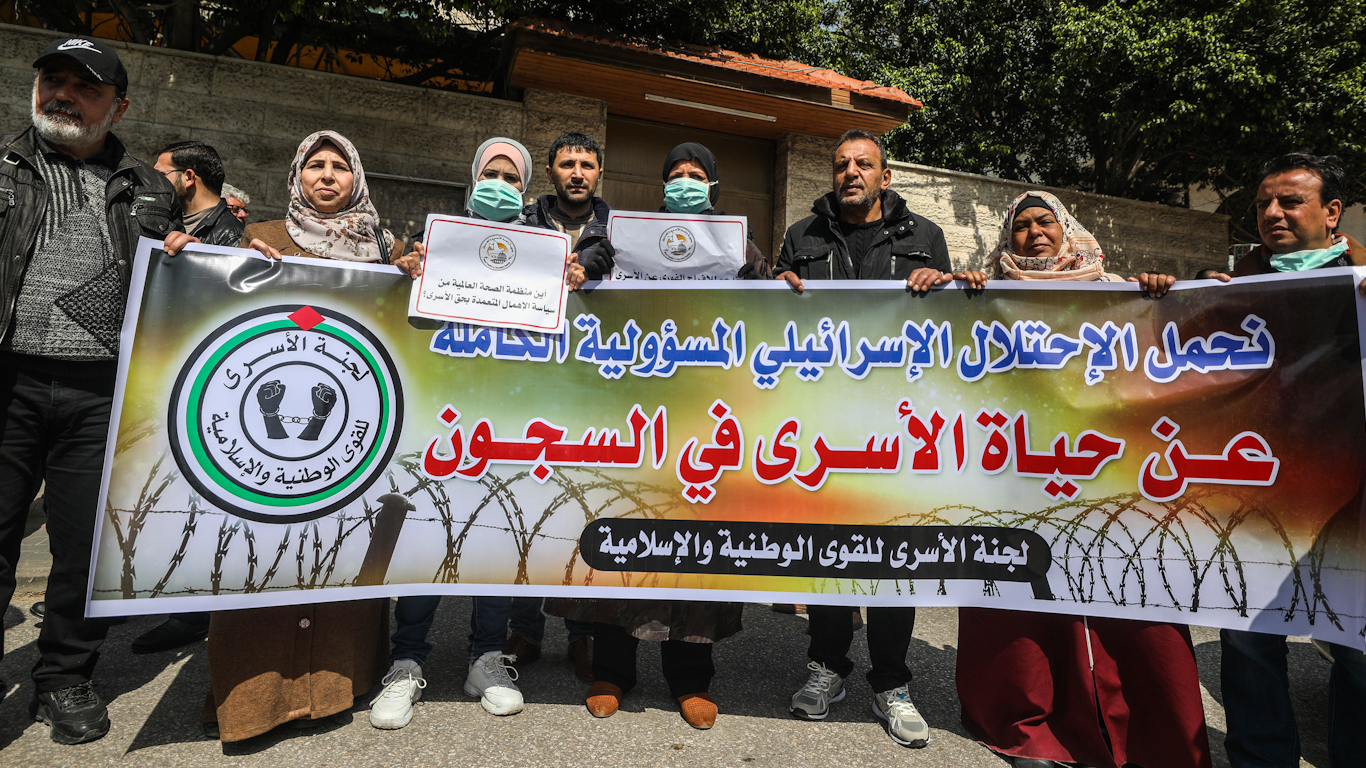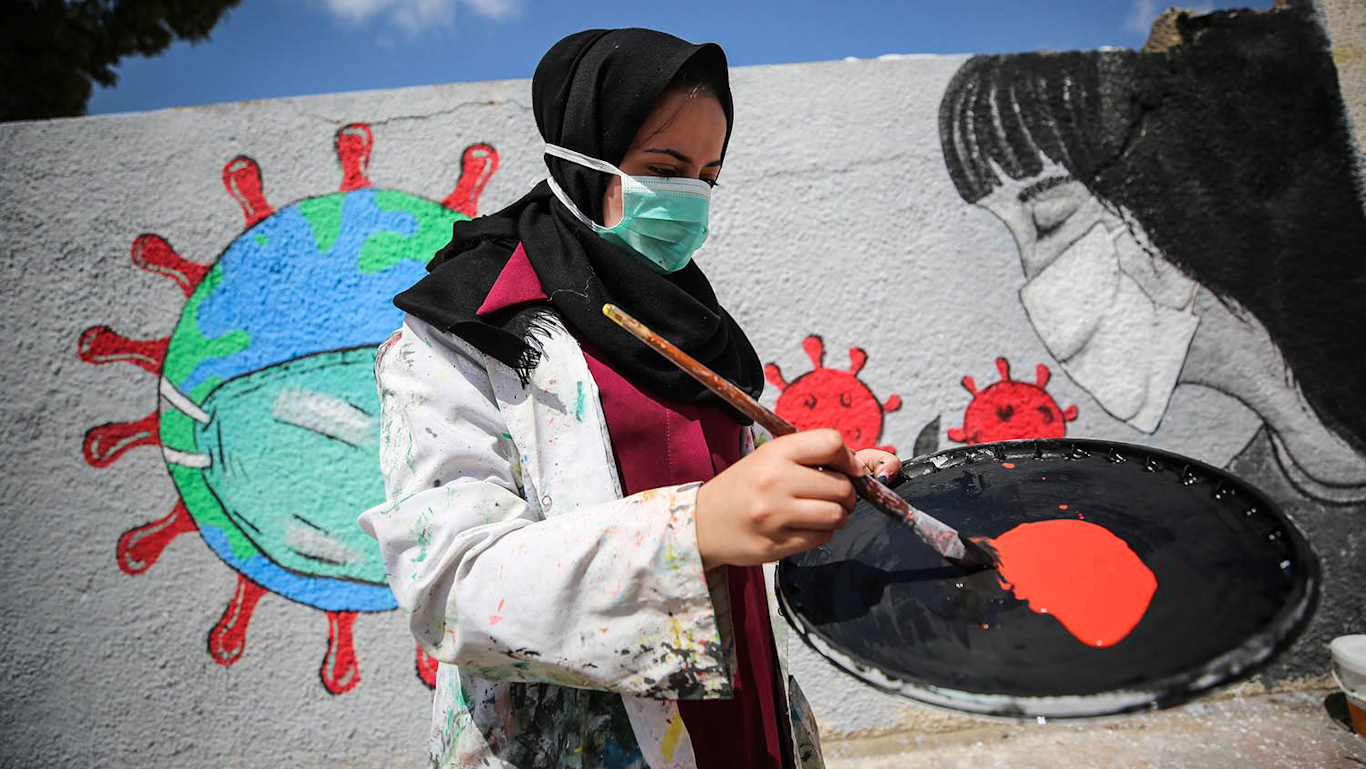Due to unequal Israeli policy prioritizing the rights of Israeli Jews over Palestinians, the novel coronavirus is asymmetrically threatening incarcerated Palestinians in Israeli prisons. This is causing international concern that the virus will spread like wildfire and infect the over 4,500 Palestinian prisoners living in dire conditions in notoriously overcrowded and unsanitary Israeli prisons, especially as Israel has thus far refused to follow the World Health Organization and United Nations guidelines on the humane treatment of prisoners amid the COVID-19 pandemic.
On Tuesday, September 8, the International Middle East Media Center (IMEMC) reported that at least twenty-seven Palestinian detainees and prisoners in Israeli prisons have tested positive for COVID-19. IMEMC added that, without independent confirmation, it is impossible to know whether this number is accurate, as the Israel Prison Service may be withholding information.
At least 700 Palestinians in Israeli prisons are known to have health conditions making them particularly susceptible to the coronavirus.
In hopes of reducing the risk of COVID-19 exposure for its Jewish population, in July — the Israeli Prison service approved the transfer of five hundred Israeli prisoners to house arrest, but have subsequently refused to provide the same for Palestinian prisoners. Numerous groups in Israel and worldwide use the word “apartheid” when describing the disparity in official policies for Israelis versus Palestinians.
UN human rights advocates expressed outrage that Israel “has not applied similar measures to Palestinian prisoners,” calling it “discriminatory treatment” and “a violation of international law.” UN advocates added that, since all legal proceedings are postponed due to the pandemic, IPS should also release all Palestinians being held in administrative detention – a designation for prisoners held without charge.
The vast majority of these detainees are being held because of their political affiliation and other spurious allegations (even waving a Palestinian flag can result in detention), or for throwing stones – an act that can land a Palestinian (though not an Israeli) behind bars for up to twenty years.
Unequal treatment
International human rights attorney Shannon Maree Torrens articulates Israel’s obligation as occupier:
According to international humanitarian law…Israel is required to maintain medical establishments and hospitals, ensure public health and hygiene and importantly in the current circumstances – prevent the spread of contagious diseases and epidemics.”
As early in the pandemic as March, the Al Mezan Center for Human Rights petitioned the Israel Prison Service to initiate measures to reduce crowding, improve hygiene, and adjust the amount of interaction between prison personnel and prisoners. Al Mezan’s demands were based on World Health Organization and United Nations guidelines and recommendations.

ReliefWeb reports that the IPS response was “evasive,” and “the conditions in Israeli prisons [continued] to deteriorate.”
Gilboa prison, with 450 Palestinian security prisoners, has reported a particularly high COVID infection rate. Adalah, a Palestinian prisoners’ rights group, petitioned the Israeli Supreme Court, demanding that Israel enable social distancing guidelines in the prison. The court rejected the petition and fined Adalah 5,000 NIS (about $1,400) for court costs.
Child incarceration
Since 2000, roughly 10,000 Palestinian children have been held in Israeli military detention. On average, 500-700 Palestinian children are tried in Israeli military court each year, most often for stone-throwing. As of the end of June 2020, over 150 children languished in Israeli prisons with all family visits canceled due to the pandemic, which for incarcerated Palestinian minors and their families, is just another layer of discrimination and danger.
The first diagnosed child COVID case (as reported by Israel) occurred in August, but for months, Defense of Children International – Palestine (DCIP) and the UN have been calling for Israel to release all minors in detention, to no avail.
International law characterizes the detention of children as a “measure of last resort,” but In Israel, it is the norm. The No Way To Treat a Child (NWTTAC) campaign points out that Israel is the only country in the world, “that automatically and systematically prosecutes children in military courts that lack fundamental fair trial rights and protections,” adding that the “Ill-treatment in the Israeli military detention system remains “widespread, systematic, and institutionalized throughout the process.”
https://twitter.com/MirandaCleland/status/1287443800772796418
The NWTTAC campaign is designed to hold Israel accountable for its treatment of Palestinian child detainees and includes an effort to pass H.R.2407 in the U.S. Congress.
All Palestinians at risk
Gaza has also seen a recent spike in COVID-19 cases and has appealed to the global community for assistance. The enclave is in its thirteenth year of a brutal Israeli blockade that prohibits essential items – including many medical supplies – from reaching the people.
Israel has indicated that it has no plan to share its medical equipment with Gaza.
Inside the crowded refugee camps in the West Bank, the UN Relief and Works Agency (UNRWA) has seen a dramatic spike in coronavirus cases as well. The UN has stepped in and appealed to the global community for assistance.
In July, Israel demolished a Palestinian COVID-19 testing center under construction in Hebron and confiscated the medical equipment. That move tracks with a well-entrenched Israeli practice of failing to provide for the basic needs of Palestinian inmates. In 2019, for example, four inmates died from alleged medical neglect in Israeli prisons.
Many argue that even aside from international law, Israel has a moral obligation – especially during a pandemic – to care for the people of Palestine as it has nearly full control over their fate thanks to its ongoing military occupation.
Israel, however, disagrees.
Feature photo | A Palestinian painter work on a mural to draw attention to COVID-19 in Khan Yunis, Gaza, on March 28. Mustafa Hassana | Anadolu
Kathryn Shihadah writes for MintPress News and If Americans Knew. She speaks regularly about the injustice and demonization Palestinians face at the hands of Israel with complicity from the United States, especially to Christian audiences. Kathryn has lived in the Middle East for ten years and has traveled extensively. She blogs at PalestineHome.org.


